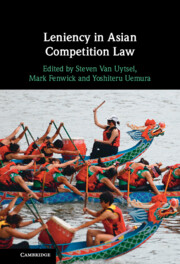Book contents
- Leniency in Asian Competition Law
- Leniency in Asian Competition Law
- Copyright page
- Contents
- Tables and Boxes
- Contributors
- Preface and Acknowledgements
- Abbreviations
- Part I Introduction
- Part II Leniency in Historical, International and Theoretical Context
- Part III Leniency Programmes in Selected Asian Jurisdictions
- Part IV Concluding Remarks
- 16 Leniency Programmes in Asia
- Appendix Schematic Overview of the Leniency Programmes from Korea, Japan, Singapore, China, India, Taiwan, Malaysia, Hong Kong and the Philippines
- Bibliography
- Index
16 - Leniency Programmes in Asia
Convergence, Divergence and Distinctiveness
from Part IV - Concluding Remarks
Published online by Cambridge University Press: 15 September 2022
- Leniency in Asian Competition Law
- Leniency in Asian Competition Law
- Copyright page
- Contents
- Tables and Boxes
- Contributors
- Preface and Acknowledgements
- Abbreviations
- Part I Introduction
- Part II Leniency in Historical, International and Theoretical Context
- Part III Leniency Programmes in Selected Asian Jurisdictions
- Part IV Concluding Remarks
- 16 Leniency Programmes in Asia
- Appendix Schematic Overview of the Leniency Programmes from Korea, Japan, Singapore, China, India, Taiwan, Malaysia, Hong Kong and the Philippines
- Bibliography
- Index
Summary
The concluding chapter argues that the Asian leniency programmes only converge on the core elements of a leniency programme. The core elements are the building blocks of a leniency programme. However, the composition of these blocks is often different. Some of the differences are subtle. Other differences make the respective leniency programme distinct from the others. Some of the distinctive elements are not necessarily part of the building blocks any more and thus give a unique character to the respective leniency programme. This chapter further claims that these differences can be explained by either the political economy of a country, experimentation due to prior negative enforcement results and a desire to achieve better enforcement results, or foreign influence. Since the result of experimentation cannot always be predicted, the authors estimate that further amendments will be made to the Asian leniency programmes.
Keywords
- Type
- Chapter
- Information
- Leniency in Asian Competition Law , pp. 395 - 414Publisher: Cambridge University PressPrint publication year: 2022

